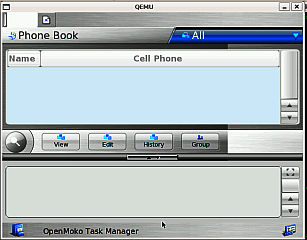Over the last month, I've been poking around OpenMoko. The real reason was because toolz had a prototype phone with him. But the real reason I got anything done on the platform is because of the software emulation mode, with qemu-arm. The openmoko wiki has a fair bit of detail on running under QEMU - but if you just want pre-packaged ready to run QEMU images, take a look at jebba's pre-built images. All I've added to that is the qemu tun-tap network adapter ( -net nic -net tap ) so that I can scp stuff in & out of the phone image. Here's how the applications actually look on the emulator phone (it is *very* CPU heavy - if you have a Core2Duo or something, this would be a nice time to take a look at man taskset(1))

pnet on moko: Back in 2005, krokas had built the OE based packages for pnet. So essentially, building pnet ipks for OpenMoko is no different from building it for any other OE platform, especially because pnet hsa nearly no dependencies on anything beyong libc and libX11.

But the register asm() trick pnet uses to ensure that values like program counter and frame pointer are stored in the correct registers does not work on arm gcc-4.1.1. Aleksey has implemented a couple of solutions like the __asm__ barriers. But as of now, the engine is running in pure interpreter mode, which is not fast enough.
The emulator mode is pretty decent - even with the stock qemu-arm. If my interest keeps up, I'll probably try the OpenMoko patched qemu. I did build the whole toolchain and rootfs from scratch with MokoMakefile - but monotone is really painful to set up and the entire build takes a whopping 14 gigs of space on my disk. So if you're thinking of playing around with moko, don't try that first up :)
--Telephone, n.:
An invention of the devil which abrogates some of the advantages of making a disagreeable person keep his distance.
-- Ambrose Bierce
